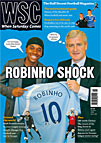 London winning the right to stage the 2012 Olympic Games has dominated the agenda this month
London winning the right to stage the 2012 Olympic Games has dominated the agenda this month
Anyone who winced through the eye-wateringly bad “celebration” of London’s staging of the 2012 Olympics held in The Mall on Sunday, August 24, had better steel themselves for four long years of witless build-up, from which football, sadly, will not be immune. The sporting and political establishment are only too aware of the commercial opportunities such a team could provide and they aren’t going to let it go.
Lord Moynihan was one of many politicians who held football in contempt during the late 1980s when, as sports minister, he attempted to introduce ID cards for fans. Now, as chair of the British Olympic Association, Colin has said Britain “must and will” have a football team in 2012. In Beijing for the closing ceremony, the prime minister declared his support for the plan but his comment, reported in the Daily Telegraph, that “when the people of Scotland, Wales and Northern Ireland know that matches will be taking place outside London, they will approve”, simply suggests that his misreading of the public mood is as thorough as opinion polls indicate.
With the other UK FAs resolutely opposed, this will have to be an entirely English selection. However the creation of a “Team GB” football squad may still threaten the individual FAs’ status within FIFA, several of whose members regularly protest about the continued existence of the four separate national sides. So far Sepp Blatter hasn’t provided much reassurance on this point, saying simply: “It is a unique problem. But for us it’s not important if all the players are from England.”
Harry Redknapp, always happy to help his many chums in the press, declared an interest in managing Team GB on the day of that dismal jamboree outside Buckingham Palace. Part of the enticement for Harry, according to the Sunday Mirror, was that the games will be held in his “old stamping ground in East London”. West Ham are still being widely tipped to become tenants at the stadium once the Games are over, so Harry may yet find himself working in Stratford even if he doesn’t ever get to wear an Olympic tracksuit – although the rumours that he will soon succeed Alan Curbishley are apparently “a load of old rubbish”.
Lord Coe and Gordon Brown have both stated a preference for Sir Alex Ferguson to run the team, with the prime minister allegedly having even broached the subject in conversation. Sir Alex is expected to step down as Manchester United manager at least a couple of years before the Games but he has made no declaration of interest in the Olympic job. Indeed, he appeared to write off the whole idea earlier in the summer. “Scotland, Northern Ireland, Wales, even England, all have their own identities, so I don’t think it is a starter,” he told the Times in July. He wafted away the latest entreaties with a joke before the European Super Cup: “I won’t involve myself in that, crikey – it’s four years away and I may not be alive then.”
It seemed inevitable that comparisons would be drawn in the press between the successful British Olympians and the pampered millionaires of the Premier League. Jeff Powell duly obliged in the Daily Mail after England’s friendly draw with the Czech Republic – “a couple of Wednesday night’s twerps own more luxury cars between them than the tally of gold medals GB are bringing home from Beijing” – but there was much less carping than might have been expected. The headline on Andy Dunn’s News of the World column on this subject referred to “footballers’ obscene salaries”, but the accompanying article pointed out that player are “soft targets” in this context and “key components of a sport that captivates a global audience not just once every four years”. Dunn was one of several commentators to suggest that one area in which footballers could learn from the Olympians is in how to present themselves to the media, a theme also addressed by the Daily Telegraph’s Jim White when discussing the medallists in the velodrome: “There is no excuse for the rider, no blame to hide behind. Compare that to the mentality of the English professional footballer, for whom an excuse is never more than a whinge away. Watch Match of the Day tonight and you will learn that failure was the fault of the ref, the manager, the pitch. Never the player.”
Then again, Olympic competitors are better able to come across as likeable ordinary people because access to them is not as rigidly controlled as it is for footballers, whose every public utterance is monitored by various vested interests including their clubs and their agents. Premier League players can seem like a protected species who are distanced from reality, but that would be the case for other sports people too if their lives were put under the microscope in a comparable way. As we may find out over the next four years.
From WSC 260 October 2008